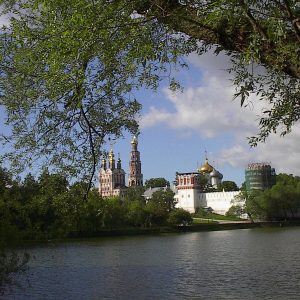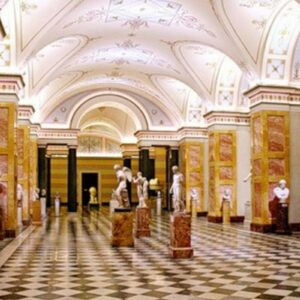REES Alumni
Learn about the careers and activities of recent and past graduates.
Tedi Beemer ’20
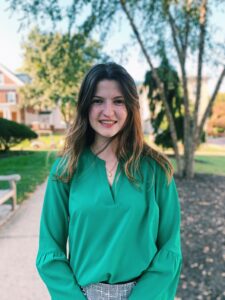
I’m majoring in REES because of the interdisciplinary nature of the program. While pursuing a degree in REES, I’ve explored history, art, comparative literature, and language; few other departments on campus offer such a breadth of curriculum. The small department size facilitates connection between students and professors. I took a class with my thesis advisor, Professor Ceballos, during my first year of college; now, she’s overseeing my research on the construction of hydroelectric dams in the U.S. and U.S.S.R. during the Cold War. I was recently endorsed by Lafayette College to present this research at the NCUR 2020 Conference in Bozeman, Montana. I’m so excited for this opportunity to represent Lafayette’s REES department! Once I graduate, I’d love to work abroad for a year before attending law school in a big city somewhere on the East Coast.

As someone who’s always been interested in languages, I came to Lafayette wanting to build upon that interest. I started out my first year learning German, but I later expanded to learning the Russian language. For me, learning Russian would be a unique challenge and give me an opportunity to learn more about Eastern Europe and everything in it. Over time, I found myself wanting to learn more about this region of the world, especially Russia. Because of my other keen interest in history, I was gradually drawn more and more towards studying how Russian history has progressed and how so much of European and world history has been shaped by this country. It was this infusion with my historical interests that led me to want to do a second major in the REES program at Lafayette. Being a part of the REES program has not only deepened my connection to history, but also allowed me to understand more about Russian culture and how the country stands as it does today. In the future I hope to continue my academic pursuits looking at Russian and Eastern Europe as this area of the world has so much to offer anyone willing to explore it, whether that be in history, the arts, literature, or other forms of academia.
Nicole Harry ’19
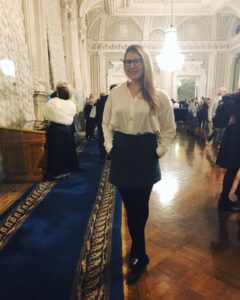
Lafayette’s REES department provided me with an excellent foundation and support, both in and out of the classroom, as my passion for Russian history and culture developed. I participated as an EXCEL research scholar within the REES department, which first initiated my interest in Russia and Eastern Europe. With interdisciplinary support from across the department, I embarked upon my own independent research project with my senior honors thesis. This project focused on Soviet propaganda against Radio Free Europe and Radio Liberty throughout the 1970s. I was extremely fortunate to represent Lafayette and the REES department by presenting my thesis at the National Conference for Undergraduate Research (2019).
Beyond my academic work while at Lafayette, my postgraduate opportunities have been inspired by my experiences in the REES department. I spent my past summer working at the Museum of Russian Icons where I curated an exhibit on a collection of Soviet anti-religious propaganda posters, continuing my interest in media propaganda of the late Soviet period. Additionally, I have decided to pursue a PhD in Russian history and am currently spending the 2019-2020 academic year in Saint Petersburg, Russia to strengthen my Russian language skills before beginning a post-graduate program.
This time in Russia and preparation for continued academic work is the culmination of my time with the REES department. Thus, I am extremely grateful for the personal interest and support within the REES department for providing me the educational foundation in order to pursue my post-graduate goals.
Susan Grunewald ’11
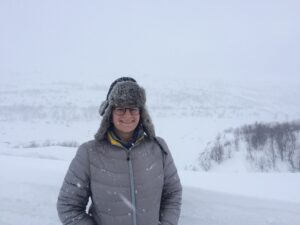
Susan majored in Russian and East European Studies and minored in German at Lafayette. Becoming infatuated with Soviet history and the Russian language after a year of remedial Russian language in high school, Susan enrolled in Lafayette specifically to major in REES. She wrote her honor’s thesis under the direction of Joshua Sanborn of the History Department. After Lafayette, she spent a year as a Fulbright English Teaching Assistant in the Applied Linguistics Department of the Ulyanovsk State Technical University in Russia, where she developed a passion for teaching and decided to pursue an advanced degree in History. She received her doctoral degree in History at Carnegie Mellon University in May 2019 and is currently the Digital History Postdoctoral Associate at the University of Pittsburgh’s World History Center. She is a member of the Association of Slavic, East European, and Eurasian Studies (ASEEES), where she serves as a board member for the affiliate group SlavicDH. ASEEES also graciously funded her dissertation research with a Cohen-Tucker Dissertation Research Fellowship. Susan attempts to visit Russia as often as possible and still despises the genitive plural and verbs of motion. Please heckle her on Twitter at @SusanGrunewald1.
Stephanie Stawicki ’04
Stephanie Stawicki graduated with honors in 2004 with degrees in international affairs and Russian and Eastern European studies. While at Lafayette, she volunteered with the Landis Center for Community Engagement and served as program coordinator for the Office of Admissions’ prospective student open houses. She participated in two interim programs in Russia & Poland and Kenya & Tanzania. She also studied for one semester at the University of Melbourne In Australia. Stephanie worked as an EXCEL scholar for Dr. Sanborn and he served as her honors thesis advisor.
After graduation, Stephanie worked as a district representative for the office of a U.S. Congressman. She handled constituent immigration and citizenship matters, working closely with the Department of Homeland Security, the State Department, and the local constituency. In 2007, Stephanie joined the U.S. Peace Corps and served as a health and community development volunteer in The Gambia, West Africa. Stephanie completed her Peace Corps service in 2009. She began graduate school for her master’s in public administration in development practice in fall 2010.
Sarah Glacel ’01
Sarah Glacel graduated from Lafayette in 2001 with degrees in REES and international affairs. Upon graduating from Lafayette, she received a Fulbright Scholarship to study in Irkutsk, Russia, where she completed a graduate degree in history from Irkutsk State University and worked at a leading Siberian environmental NGO. Since returning from Russia, she has worked in the field of media research in Eurasia and Eastern Europe and currently acts as a senior audience research specialist for Radio Free Europe/Radio Liberty.
Shannon Tyburczy ’01
I graduated summa cum laude from Lafayette in 2001 with a double major in history and Russian/East European Studies. I was awarded a James Madison Fellowship, and this allowed me to attend graduate school full time. The fellowship is awarded to teachers and prospective teachers who will be working with American history and the Constitution. During 2002, I spent the summer studying at Georgetown University and visiting the various historic sites around D.C. and Virginia.
I earned my MA in secondary education in 2003 and began teaching at Northampton High School that fall. Although I have taught many of the various social studies classes, I primarily focus on American history and government.
Jacqueline Olich ’92
Jacqueline Olich is the associate director of the Center for Slavic, Eurasian, and East European Studies at the University of North Carolina at Chapel Hill. She teaches in the curriculum in Russian and East European Studies, administers the Foreign Language and Area Studies (FLAS) Fellowships awarded through the U.S. Department of Education, and coordinates community and campus outreach activities. She is also adjunct assistant professor, University of North Carolina at Chapel Hill Department of History. From 1993-2004 she was a director for Diba Industries, now part of the multinational Halma Technology Group (LSE: HLMA).
Jacqueline earned her M.A. and Ph.D. in History at University of North Carolina, Chapel Hill. She researches, writes, and teaches on the comparative history of childhood and children’s culture. Her writing has appeared in The Journal of the History of Childhood and Youth, The Encyclopedia of Russian History, Russian History, and Slavonica. She is the author of Competing Ideologies and Children’s Literature in Russia, 1918-1935. She serves on the County of Durham Women’s Commission. Recently, she was selected to take part in BRIDGES, an intensive leadership development program for women in higher education.
While at Lafayette, Jacqueline graduated cum laude with a B.A. in History (Phi Beta Kappa, Phi Alpha Theta). As a student she participated in the Lafayette Activities Forum, L.E.A.P. (Lafayette Environmental Awareness Program) and was co-founder of the Lafayette Campus Recycling Program.
Alumni are invited to send brief biographies (including year of graduation), what you’re doing now personally and professionally, and pictures for posting on this site. Send all materials to Professor Ceballos at ceballol@lafayette.edu.


